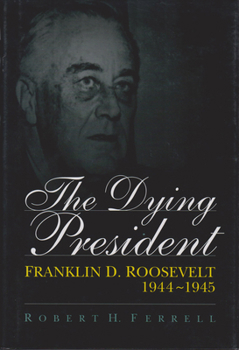The Dying President: Franklin D. Roosevelt, 1944-1945
Select Format
Select Condition 
Book Overview
In this authoritative account, Robert H. Ferrell shows how the treatment of President Franklin D. Roosevelt's illness in 1944- 1945 was managed by none other than the president himself. Although this... This description may be from another edition of this product.
Format:Hardcover
Language:English
ISBN:0826211712
ISBN13:9780826211712
Release Date:April 1998
Publisher:University of Missouri Press
Length:200 Pages
Weight:1.17 lbs.
Dimensions:0.8" x 6.3" x 9.3"
Customer Reviews
2 ratings
Worthwhile reading for our times
Published by Thriftbooks.com User , 23 years ago
Some have written that Ferrell's work is sloppy and depressing. I disagree. Ferrell does an excellent job of showing 21st Century readers just how different this country was 50 years ago. That the entire country could look at Roosevelt during his last run for office - and know that he was a dying man - and not know it at the same time, is amazing. This is the same country that couldn't deal directly with a President in a wheel chair. The country knew it, but didn't know it, all at the same time. How different was the relationship between the press and the White House! The purpose of this book is not simply to drive home the point that Roosevelt was a dying man when he ran for a fourth term. The point of this book is about collective denial. The fact that most of the country suffered from it, used it, and both benefitted from it in some ways, and paid for it in others. Collective denial isn't much different from individual denial. It is a powerful mechanism that existed not only in the relationship between FDR and the country, but between FDR and himself. It also is the mechanism that allowed the United States to fight WWII to "make the world safe for democracy," while at the same time the country was somehow unaware of its own racist, anti-democratic values. Ferrell's book should be read within the context of the times, so that it may shed light on ours.
A brilliant analysis that sheds new light on FDR's legacy.
Published by Thriftbooks.com User , 26 years ago
Though a definitive account of FDR's health problems may never be possible, Ferrell's book is probably as close as we are likely to come. As Ferrell recounts, FDR by 1944 was so ill that he could put in no more than four hours of work a day, and usually only one or two. Unable to concentrate for long periods, FDR gave intermient attention to postwar foreign policy and addressed problems piecemeal. Put simply, FDR was incapable of overseeing the development of coherent and consistent policies. If Ferrell is right, and I find his evidence compelling, the notion advanced by some historians that Truman reversed FDR's policy of postwar cooperation with the Soviet Union, thereby precipitating the cold war, needs rethinking. Ferrell has done a laudable job, not only of shedding new light on FDR's medical problems, but of bring out their broader implications.






